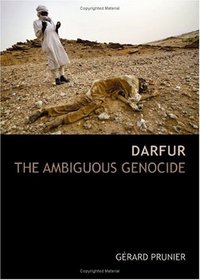Search -
Darfur: The Ambiguous Genocide
Darfur The Ambiguous Genocide
Author:
In mid-2004 the Darfur crisis in Western Sudan forced itself onto the center stage of world affairs. Arab Janjaweed militias, who support the Khartoum government, have engaged in a campaign of violence against the residents of Western Sudan. A formerly obscure ‘tribal conflict’ in the heart of Africa has escalated into the first genoci... more »
Author:
In mid-2004 the Darfur crisis in Western Sudan forced itself onto the center stage of world affairs. Arab Janjaweed militias, who support the Khartoum government, have engaged in a campaign of violence against the residents of Western Sudan. A formerly obscure ‘tribal conflict’ in the heart of Africa has escalated into the first genoci... more »
ISBN-13: 9780801444500
ISBN-10: 0801444500
Publication Date: 8/26/2005
Pages: 240
Rating: ?
ISBN-10: 0801444500
Publication Date: 8/26/2005
Pages: 240
Rating: ?
0 stars, based on 0 rating
Publisher: Cornell University Press
Book Type: Hardcover
Members Wishing: 0
Reviews: Amazon | Write a Review
Book Type: Hardcover
Members Wishing: 0
Reviews: Amazon | Write a Review
Genres:
- History >> Africa >> Sudan
- Uncategorized >> International & World Politics >> National & International Security
- Nonfiction >> Social Sciences >> Violence in Society




